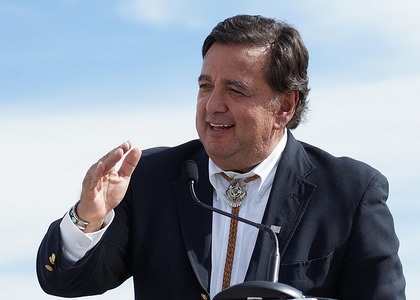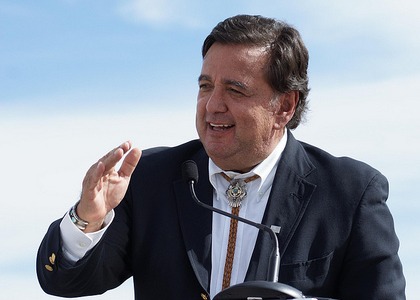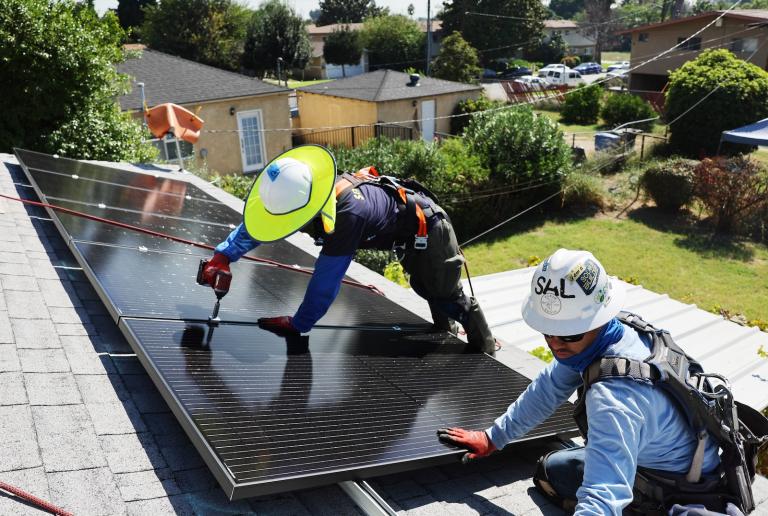 Richardson speaking at a spaceport dedication ceremony. The New Mexico governor spoke yesterday at Using All Tools at Our Disposal.Photo: Jeff FoustI wrote yesterday about six companies that are taking greenhouse-gas-emission reductions into their own hands. But businesses aren’t alone — state and local governments are also stepping up to the plate. A COP-16 side event Monday entitled “Using All Tools at Our Disposal” highlighted some of the progress state governments have made in recent years.
Richardson speaking at a spaceport dedication ceremony. The New Mexico governor spoke yesterday at Using All Tools at Our Disposal.Photo: Jeff FoustI wrote yesterday about six companies that are taking greenhouse-gas-emission reductions into their own hands. But businesses aren’t alone — state and local governments are also stepping up to the plate. A COP-16 side event Monday entitled “Using All Tools at Our Disposal” highlighted some of the progress state governments have made in recent years.
The featured speaker at the event was New Mexico Governor and former Secretary of Energy Bill Richardson (D). Richardson framed the discussion by pointing out that climate change impacts aren’t just something we need to worry about in the distant future — they’re here now. “In New Mexico, average temperatures have risen 1.8 degrees Fahrenheit since 1976 … so in my state we have no time to lose,” he explained.
He noted some of the challenges he faced in his efforts to transform the state’s energy policies, including stiff opposition from the fossil-fuel industry. Those challenges, however, are overshadowed by the opportunities presented by clean energy. “Even though the challenges are many, we also have many opportunities to address climate change while building an environmentally sustainable economy for the future,” he said. The governor insisted that while domestic legislation and a binding international agreement to reduce emissions are absolutely necessary, states must move forward with their own efforts in the meantime.
Richardson then touted some of the state’s clean-energy and emission-reduction accomplishments during his tenure, such as participating in the Western Climate Initiative, seeking out clean-energy companies and enticing them to do business in New Mexico, and collaborating with federal agencies on sustainable energy projects. He also brought up the economic benefits of clean energy policies. “Clean energy and environmental sustainability create jobs,” he said. “These are the jobs of the future.”
Richardson was joined on the panel by several other individuals responsible for implementing climate and energy policies at the state level:
- Doug Scott, director of the Illinois EPA, discussed the retrofitting of school buses, no till-farming techniques, and methane digesters. Like Richardson, Scott also brought up the job-creation potential of clean energy. “The good news is that because of the emphasis on renewables that has taken place … there’s lots of extra work to go around,” he said.
- Ricardo Martinez, deputy secretary of the California EPA, talked about the state’s leadership on clean energy policies. He discussed some of California’s major policy victories, such as the Global Warming Solutions Act, the low carbon fuel standard, the Green Building Initiative, and the 33 percent by 2020 renewable electricity standard. He was particularly excited about the California Solar Initiative, a plan to install solar panels on one million California homes by 2016. “We have created a market, and a market creates jobs, and jobs are good for everybody,” he said.
- Jared Snyder of the New York Department of Environmental Conservation highlighted his state’s vulnerability to the impacts of climate change. While water shortages are a major concern in New Mexico, New York faces problems at the other end of the spectrum: extreme rainfall and sea level rise. Snyder also discussed some of New York’s clean energy accomplishments, including 1,200+ megawatts of installed wind energy capacity and another 400 megawatts in the pipeline. He took particular pride in a state program that had trained 20,000 workers to implement energy efficiency programs.
While each of these four panelists offered unique approaches to reducing emissions, they have a few things in common. They all recognize both the urgency and the solvability of the climate crisis, and they’ve each begun the critical work of reducing emissions in their respective states.



